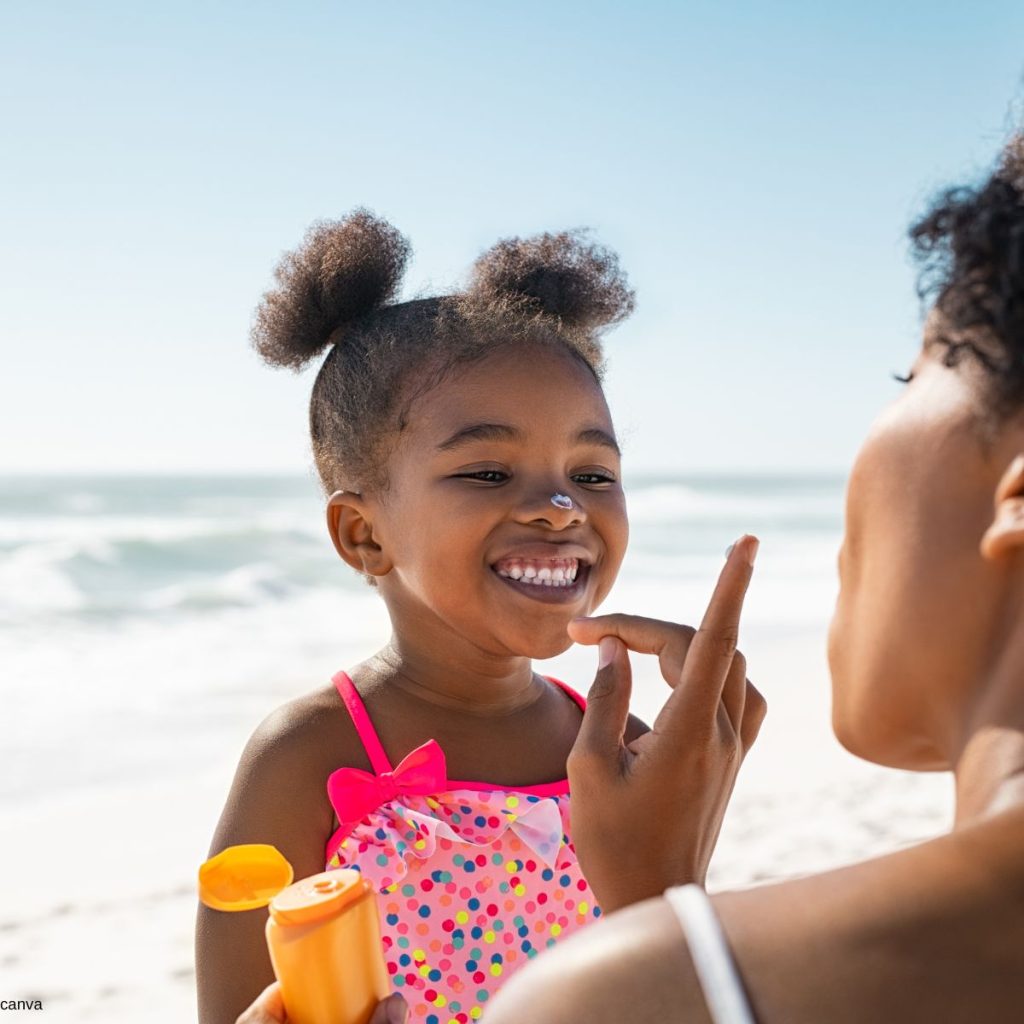Why is it important to wear sunscreen every day? This is an unanswered question in the minds of many people including myself until I saw the light.
In this post, you will discover a few reasons why you should always wear sunscreen and incorporate it into your skincare routine if you haven’t started.

What is Sunscreen
Sunscreen is a topical product that helps to protect the skin from the sun’s harmful ultraviolet (UV) rays. Numerous skin issues, such as sunburn, early aging, and skin cancer, can be brought on by ultraviolet (UV) rays. UV rays are absorbed or reflected by sunscreen, which stops them from reaching the skin.
While some alternatives offer moderate protection, nothing truly compares to the effectiveness of sunscreen. Sunscreen is an indispensable component of skincare, significantly reducing your risk of skin cancer, and preventing dryness and sunburns. If you plan to spend any significant time outdoors, sunscreen is an absolute necessity.
The sun’s ultraviolet (UV) rays are always present, even on cloudy days. These rays can damage your skin and increase your risk of skin cancer. Here are some tips for protecting our skin from the sun:
Even on cloudy days, apply a broad-spectrum sunscreen with an SPF of 30 or higher every day.
Apply sunscreen to all exposed skin, including your face, ears, neck, hands, and feet.
To protect your skin from the sun, reapply your sunscreen every two hours, or more often if you are sweating or swimming. When you’re outside, dress safely by wearing a hat and sunglasses. Avoid the sun during the middle of the day, when the sun’s rays are strongest.
You can shield your skin from harmful rays from the sun by using these tips.
Types of Sunscreens
Chemical sunscreens absorb UV rays like a sponge, while mineral sunscreens sit on top of the skin and scatter UV rays away. Chemical sunscreens have been linked to environmental harm and may also have negative health effects.
Mineral-based sunscreens are considered a safer option. If you haven’t decided on the best sunscreen for your skin type, check the difference between chemical and mineral sunscreen on Healthline.

When to Apply Sunscreen
There is no specific time to apply sunscreen but it is generally recommended to apply sunscreen approximately 30 minutes before going outdoors. This is to allow the sunscreen to absorb into the skin and provide optimal protection. The exact timing may vary depending on the type of sunscreen you are using and the level of sun exposure you expect.
Always check the expiration of your sunscreen and If there is no expiration date on the sunscreen, write the purchase date on it with a permanent marker or label. Your sunscreen should be discarded after three (3) years from the date of manufacture, even if it hasn’t been opened.
Throw that sunscreen away if it changes color, separates, or has a different consistency than when you first bought it.
You can follow these useful guides for when to apply sunscreen
Chemical sunscreens: Apply chemical sunscreens 30 minutes before going outdoors to give them time to absorb into the skin.
Mineral sunscreens: Apply mineral sunscreens 15 minutes before going outdoors. When out in the sun, apply a mineral-based sunscreen with at least SPF 30 every two to three hours.
How to Wear your Sunscreen
- Reapply your sunscreen every two hours, or more often if you are sweating or swimming.
- Consider reapplying after towel drying. Even if you are using a water-resistant sunscreen, it is a good idea to reapply it after towel drying, as this can remove some of the sunscreens.
- Reapply after eating or drinking if you are eating or drinking outdoors, reapply sunscreen after you finish, as food and drink can rub off some of the sunscreen.
- Apply sunscreen even on cloudy days since the clouds can let in up to 80% of the sun’s UV radiation. Therefore, it is important to wear sunscreen even on cloudy days.
- Use sunscreen in the winter: The sun’s UV rays can reach the skin even in the winter, so it is important to wear sunscreen year-round.
- Apply sunscreen to all exposed skin: Be sure to apply sunscreen to all exposed skin, including the face, neck, ears, hands, and feet.
These tips will help to ensure that you are properly protected from the sun’s harmful UV rays.
Why is Sunscreen Important for the Face
Sunscreen is important for the face because it helps to protect the skin from the sun’s harmful ultraviolet (UV) rays. UV rays can cause a variety of skin problems, including sunburn, premature aging, and skin cancer.
UV rays are absorbed or reflected by sunscreen, which stops them from reaching the skin. The skin can be effectively shielded from the sun’s damaging rays by using either form of sunscreen. However, mineral sunscreens are generally considered to be more gentle on the skin and are less likely to irritate.
Here are some specific benefits of using sunscreen on the face
Prevents sunburn: Sunburn is a painful and damaging condition that can cause redness, blistering, and peeling. Sunscreen can help to prevent sunburn by blocking UV rays.
Prevents premature aging: UV rays can cause premature aging of the skin, leading to wrinkles, fine lines, and age spots. Sunscreen can help to prevent premature aging by protecting the skin from UV damage.
Protects against skin cancer: Skin cancer is the most common type of cancer in the United States. UV rays are the main cause of skin conditions. Sunscreen can help to protect against skin cancer by blocking UV rays.
In addition to the benefits listed above, sunscreen can also help
Even out skin tone: Sun exposure can cause uneven skin tone, with some areas appearing darker than others. Sunscreen can help to even out skin tone by protecting the skin from UV damage.
Reduce the appearance of dark spots: Dark spots, also known as sunspots or age spots, are areas of hyperpigmentation caused by sun exposure. Sunscreen can help to reduce the appearance of dark spots by protecting the skin from UV damage.
Improve skin texture: Sun exposure can damage the skin’s collagen and elastin, leading to rough, uneven skin texture. Sunscreen can help to improve skin texture by protecting the skin from UV damage.
How to use your sunscreen every day? It is important to use a sunscreen that has an SPF of 30 or higher. Apply it generously and evenly to all exposed skin, including the face, neck, and ears. Every two hours, or more frequently if you are perspiring or swimming, reapply sunscreen.
Here are some additional tips for protecting your face from the sun
Seek shade during the middle of the day: The sun’s rays are strongest between 10 am and 4 pm. Seek shade during these hours to reduce your exposure to UV rays.
Wear protective clothing: Wear a wide-brimmed hat and sunglasses to protect your face from the sun’s rays.
Examine your skin regularly: Be sure to examine your skin regularly for new or changing moles, freckles, bumps, or birthmarks. See your doctor if you notice any changes.
By following these tips, you can help protect your face from the sun’s harmful rays and keep your skin healthy and youthful for years to come.
Reasons Not to Wear Sunscreen
While sunscreen is generally considered safe and effective, there are some potential drawbacks to consider. These include concerns about the ingredients, interference with vitamin D production, potential for skin irritation, a false sense of security, and environmental concerns. It’s important to weigh the potential benefits and drawbacks of sunscreen use to make the best decision for your individual needs.

Are There Substitutes for Sunscreen
There are natural sunscreen substitutes that have been found to shield our skin from UVA and UVB rays from the sun. Some of these are shea butter, coconut oil, avocado oil, and plant-based oils. While natural sunscreen substitutes do offer certain advantages for the skin, they are not the best option for protecting the skin from UV rays. It is advised to look for SPF 30 plus that can protect you from UVA and UVB radiation if you spend a lot of time outside.
On a lighter note
Everyone should wear sunscreen every day, no matter their skin tone or the weather. You will find some of the benefits of wearing sunscreen on your face every day, especially on black skin.
What say you?
Do you wear your sunscreen every day? We’d love to hear from you.

Leave a Reply